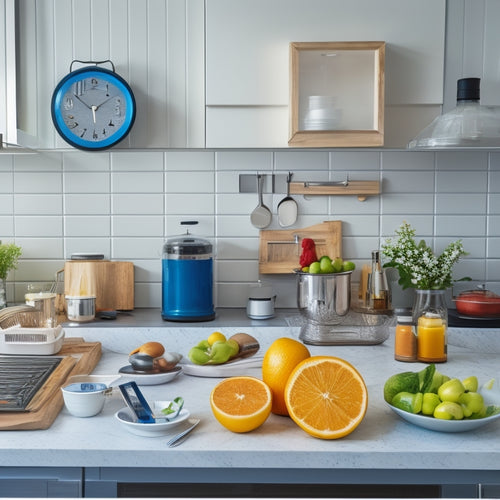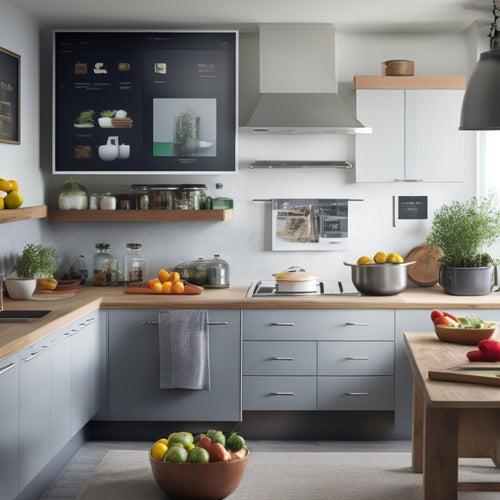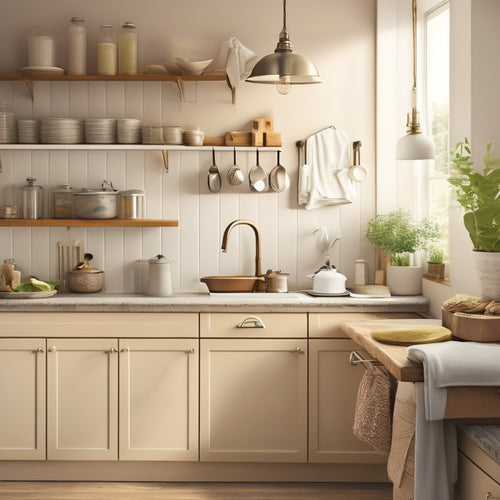
Master Zero Waste Cooking With Simple Tips
Share
You're about to revolutionize your kitchen with zero-waste cooking! Start by stocking your kitchen with essential tools and ingredients, planning meals, and focusing on sustainable meal prep. Organize your kitchen with a 'first in, first out' system, categorize food staples, and maintain a running inventory to reduce waste. Use airtight storage containers, reusable bags, and a compost bin to maximize leftovers and minimize trash. With simple recipes like veggie stir-fry and pickled watermelon rinds, you'll be cooking with intention and reducing waste in no time. Now, get ready to open a world of creative, sustainable cooking possibilities!
Key Takeaways
• Stock your kitchen with essential tools like airtight containers, reusable produce bags, and a compost bin to reduce waste.
• Plan meals and categorize your shopping list to avoid buying too much and minimize packaging waste.
• Focus on sustainable meal prep with whole grains, legumes, and seasonal produce to reduce food waste and packaging.
• Store ingredients properly in categorized zones, using the "first in, first out" system to ensure older items are consumed before they expire.
• Get creative with leftovers by transforming them into new dishes, like stir-fries or omelets, to reduce food waste and save money.
Zero Waste Cooking Essentials
By stocking your kitchen with the right tools and ingredients, you'll set yourself up for zero-waste cooking success and start reducing food waste, saving money, and supporting sustainability.
For a zero-waste grocery trip, plan your meals in advance and categorize your shopping list by food categories or kitchen sections. This will help you avoid buying unnecessary items and reduce single-serving packaging.
Focus on sustainable meal prep by stocking up on whole grains, legumes, and seasonal fruits and vegetables. Don't forget to grab reusable produce bags and airtight storage containers to keep your ingredients fresh.
With these essentials in place, you'll be well on your way to cooking with zero waste and enjoying the benefits that come with it.
Kitchen Organization Strategies
Organize your kitchen like a pro by categorizing your food staples, creating a 'first in, first out' system, and keeping a running inventory of your pantry items. Make sure you use up what you already have before buying more. This strategy helps reduce food waste and saves you money.
Next, tackle your fridge organization by grouping similar items together and storing them in a way that makes sense for your shopping habits. Check expiration dates regularly and move older items to the front to make sure they're used before they go bad.
Maximizing Leftovers and Storage
Take control of your leftovers and turn them into a culinary goldmine by transforming last night's dinner into tomorrow's lunch or a future meal. You can create new dishes with leftover ingredients, like chopped salads, stuffed pitas, or rice bowls.
Get creative and incorporate leftovers into omelets or pasta dishes, or bake potatoes with leftover toppings. To keep your leftovers fresh, use proper storage techniques. Set your fridge temperature between 38-40 degrees and store items based on shelf temperature zones.
Keep produce drawers two-thirds full and separate fruits and vegetables based on humidity tolerance. By mastering leftover transformations and proper storage techniques, you'll reduce food waste, save money, and support sustainability.
Essential Tools and Ingredients
You'll be well on your way to reducing food waste and cooking with intention when you stock your kitchen with the right tools and ingredients, starting with essentials like airtight storage containers, reusable produce bags, and a compost bin. These sustainable kitchenware staples will help you store food properly, reducing spoilage and waste.
Next, focus on eco-friendly ingredients like whole grains, legumes, and seasonal fruits and vegetables. Herbs and spices will add flavor without adding waste, while vinegars and oils will help you create delicious, zero-waste meals. With these essentials in place, you'll be empowered to cook with intention, reducing waste and supporting a more sustainable kitchen.
Simple Zero Waste Recipes
Get ready to transform kitchen scraps into culinary masterpieces with these easy, budget-friendly zero-waste recipes that will inspire creativity and reduce food waste. From vegetable stir-fry to banana peel cake, these innovative meal ideas will revolutionize your sustainable kitchen practices.
| Recipe | Ingredients | Benefits |
|---|---|---|
| Vegetable Stir-Fry | Leftover veggies, rice | Reduces food waste, saves money |
| Homemade Broth | Veggie scraps, herbs | Uses up scraps, adds flavor |
| Fruit Peel Crisps | Fruit peels, spices | Turns waste into crispy snack |
| Banana Peel Cake | Banana peels, sugar | Creates moist dessert from scraps |
| Pickled Watermelon Rinds | Watermelon rinds, vinegar | Turns waste into tangy condiment |
These simple recipes will inspire you to think outside the box and get creative with kitchen scraps. By incorporating them into your daily cooking routine, you'll reduce food waste, save money, and develop sustainable kitchen practices that benefit the environment.
Frequently Asked Questions
How Do I Overcome the Initial Investment Cost of Zero-Waste Cooking?
As you coincidentally stumble upon zero-waste cooking, you're halted by the initial investment cost. Fear not! You can overcome this by exploring budget-friendly alternatives, like repurposing containers, and DIY solutions, such as making your own cleaning products, to get started without breaking the bank.
Can I Still Eat a Variety of Foods on a Zero-Waste Diet?
You can definitely enjoy a varied diet on a zero-waste plan! Explore diverse zero waste ingredients like seasonal fruits and whole grains, and get creative with zero waste recipe ideas like veggie stir-fries and banana peel cakes.
Do Zero-Waste Cooking Methods Take More Time and Effort?
You'll find that zero-waste cooking methods don't have to be time-consuming; by simplifying processes and meal planning, you'll actually save time and effort in the long run, making sustainable cooking a breeze.
Are There Any Zero-Waste Cooking Options for Busy Weeknights?
You think zero-waste cooking means sacrificing precious weeknight time, but you're wrong! Whip up quick recipes like veggie stir-fries and prep meals on Sundays to save time and reduce waste.
Can I Apply Zero-Waste Cooking Principles to Special Dietary Needs?
You can easily adapt zero-waste cooking to special diets by exploring vegan options like plant-based milks and gluten-free alternatives like rice flour, ensuring everyone can enjoy sustainable, waste-free meals that cater to their needs.
Related Posts
-

5 Best Ways to Boost Kitchen Productivity Online
You can significantly enhance your kitchen productivity by leveraging online resources and tools, freeing up time and...
-

Streamline Your Kitchen With Digital Storage Solutions
By embracing digital storage solutions, you can transform your kitchen into a more efficient and clutter-free space. ...
-

5 Best Kitchen Organization Products for Arthritis Relief
You're looking for ways to make meal prep easier on your joints. Arthritis can make kitchen tasks a struggle, but the...


